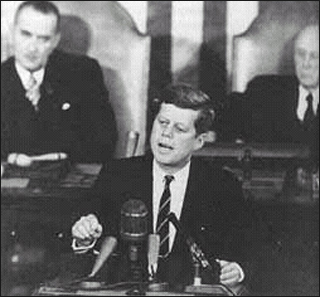Course Description
Using examples from anthropology and sociology alongside classical and contemporary social theory, this course explores the nature of dominant and subordinate relationships, types of legitimate authority, and practices of resistance. The course also examines how we are influenced in subtle ways by the people around us, …
Using examples from anthropology and sociology alongside classical and contemporary social theory, this course explores the nature of dominant and subordinate relationships, types of legitimate authority, and practices of resistance. The course also examines how we are influenced in subtle ways by the people around us, who makes controlling decisions in the family, how people get ahead at work, and whether democracies, in fact, reflect the “will of the people.”
Course Info
Learning Resource Types
assignment
Problem Sets
notes
Lecture Notes
assignment
Written Assignments

In a May 25, 1961 address to a joint session of the U.S. Congress, President John F. Kennedy establishes the goal “of landing a man on the moon and returning him safely to earth” before the decade is out. (Image courtesy of NASA.)








